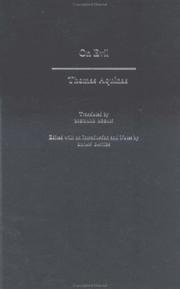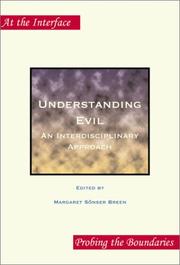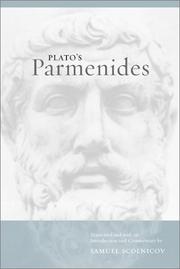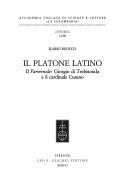| Listing 1 - 9 of 9 |
Sort by
|

ISBN: 2747545385 9782747545389 Year: 2003 Publisher: Paris: L'Harmattan,
Abstract | Keywords | Export | Availability | Bookmark
 Loading...
Loading...Choose an application
- Reference Manager
- EndNote
- RefWorks (Direct export to RefWorks)
Quand le philosophe vise le tout, sans limitation ni borne, il est amené à découvrir que le réel entier, le réel comme tel, est " dialectique " : est en somme dialogue avec lui-même, dialogue intérieur à l'être, et pas moins dialogue avec toute réalité autre. Ceci s'étend aux plus divers domaines : l'être tout court, le connaître et la conscience, la liberté, la sexualité, toute l'histoire également. Penser dialectiquement, c'est lutter contre toute fixation et fixisme, toute " glaciation ". C'est aussi re-lier toutes choses, il n'en est point qui puisse demeurer isolée dès lors qu'elle-même est toujours ouverture - autrement elle n'est " rien " en somme. Jean-Yves Calvez qui a parcouru bien des secteurs de la réflexion, en débat avec la pensée de Marx comme avec celle des historiens politiques allemands du XIXe siècle, rassemble ici ses vues fondamentales : brièvement, synthétiquement, clairement. L'ouvrage est une introduction, simple, à penser et réfléchir.
Philosophy --- DIALECTIC --- Dialectic --- Mental philosophy --- Humanities --- Polarity --- Polarity (Philosophy)

ISBN: 0199725802 1282367293 9786612367298 0195357922 1429461810 9781429461818 0195158539 0195091833 9780195357929 9781282367296 6612367296 0197740316 9780199725809 Year: 2003 Publisher: Oxford New York Oxford University Press
Abstract | Keywords | Export | Availability | Bookmark
 Loading...
Loading...Choose an application
- Reference Manager
- EndNote
- RefWorks (Direct export to RefWorks)
The 'De Malo' represents some of Aquinas' most mature thinking on goodness, badness and human agency. This text offers Richard Regan's English translation, based on the Leonine Commission's authoritative edition of the Latin text. Brian Davies has provided an extensive introduction and notes.
Good and evil. --- Sin --- Evil --- Wickedness --- Ethics --- Philosophy --- Polarity --- Religious thought --- Christianity. --- Sin.

ISBN: 1417564253 9781417564255 9401200947 9042009357 Year: 2003 Publisher: Amsterdam New York Rodopi
Abstract | Keywords | Export | Availability | Bookmark
 Loading...
Loading...Choose an application
- Reference Manager
- EndNote
- RefWorks (Direct export to RefWorks)
Written across the disciplines of law, literature, philosophy, and theology, Understanding Evil: An Interdisciplinary Approach represents wide-ranging approaches to and understandings of "evil" and "wickedness." Consisting of three sections - " Grappling with Evil ", " Justice, Responsibility, and War " and " Blame, Murder, and Retributivism " -, all the essays are inter-disciplinary and multi-disciplinary in focus. Common themes emerge around the dominant narrative movements of grieving, loss, powerlessness, and retribution that have shaped so many political and cultural issues around the world since the fall of 2001. At the same time, the interdisciplinary nature of this collection, together with the divergent views of its chapters, reminds one that, in the end, an inquiry into "evil" and "wickedness" is at its best when it promotes intelligence and compassion, creativity and cooperation. The thirteen essays are originally presented at and then developed in light of dialogues held at the Third Global Conference on Perspectives on Evil and Human Wickedness, held in March 2002 in Prague.
Collection of essays. --- Good and evil. --- Evil --- Wickedness --- Ethics --- Philosophy --- Polarity --- Religious thought

ISBN: 9401200971 1417564261 9781417564262 9042010150 Year: 2003 Publisher: Amsterdam New York, NY Rodopi
Abstract | Keywords | Export | Availability | Bookmark
 Loading...
Loading...Choose an application
- Reference Manager
- EndNote
- RefWorks (Direct export to RefWorks)
Cultural Expressions of Evil and Wickedness: Wrath, Sex, Crime , is a fascinating study of the a-temporal nature of evil in the West. The international academics and researchers who have contributed to this text not only concentrate on political, social and legally sanctioned cruelty from the past and present, but also explore the nature of moral transgression in contemporary art, media and literature. Although many forms and practices of what might be called 'evil' are analysed, all are bound by violence and/or the sexually perverse. As this book demonstrates, the old news media axiom, 'if it bleeds it leads,' also extends to the larger pool of popular culture. This absorbing volume will be of interest to anyone who has ever pondered on the exotic, extraordinary and surreal twists of human wickedness.
Immorality. --- Social ethics. --- Good and evil. --- Ethics --- Social problems --- Sociology --- Immoralism --- Right and wrong --- Evil --- Wickedness --- Philosophy --- Polarity --- Religious thought

ISBN: 0195091833 9780195091830 0195158539 Year: 2003 Publisher: Oxford ; New York : Oxford University Press,
Abstract | Keywords | Export | Availability | Bookmark
 Loading...
Loading...Choose an application
- Reference Manager
- EndNote
- RefWorks (Direct export to RefWorks)
Good and evil. --- Sin --- Christianity. --- Bien et mal --- Péché --- Christianisme --- Good and evil --- Evil --- Wickedness --- Ethics --- Philosophy --- Polarity --- Religious thought --- Christianity

ISBN: 1282355082 9786612355080 0520925114 1597348104 9780520925113 1417525517 9781417525515 9781597348102 0520224035 9780520224032 0520224035 9780520224032 9781282355088 6612355085 Year: 2003 Publisher: Berkeley University of California Press
Abstract | Keywords | Export | Availability | Bookmark
 Loading...
Loading...Choose an application
- Reference Manager
- EndNote
- RefWorks (Direct export to RefWorks)
Of all Plato's dialogues, the Parmenides is notoriously the most difficult to interpret. Scholars of all periods have disagreed about its aims and subject matter. The interpretations have ranged from reading the dialogue as an introduction to the whole of Platonic metaphysics to seeing it as a collection of sophisticated tricks, or even as an elaborate joke. This work presents an illuminating new translation of the dialogue together with an extensive introduction and running commentary, giving a unified explanation of the Parmenides and integrating it firmly within the context of Plato's metaphysics and methodology. Scolnicov shows that in the Parmenides Plato addresses the most serious challenge to his own philosophy: the monism of Parmenides and the Eleatics. In addition to providing a serious rebuttal to Parmenides, Plato here re-formulates his own theory of forms and participation, arguments that are central to the whole of Platonic thought, and provides these concepts with a rigorous logical and philosophical foundation. In Scolnicov's analysis, the Parmenides emerges as an extension of ideas from Plato's middle dialogues and as an opening to the later dialogues. Scolnicov's analysis is crisp and lucid, offering a persuasive approach to a complicated dialogue. This translation follows the Greek closely, and the commentary affords the Greekless reader a clear understanding of how Scolnicov's interpretation emerges from the text. This volume will provide a valuable introduction and framework for understanding a dialogue that continues to generate lively discussion today.
Dialectic --- Reasoning --- Ontology --- Polarity --- Polarity (Philosophy) --- Argumentation --- Ratiocination --- Reason --- Thought and thinking --- Judgment (Logic) --- Logic --- Plato. --- Zeno, --- Parmenides. --- Socrates. --- Socrates --- Socrate --- Zenón, --- Zénon, --- Zenon, --- Ζήνων, --- Zēnōn, --- Sokrates --- Sokrat, --- Sokrates, --- Suqrāṭ, --- Su-ko-la-ti, --- Sugeladi, --- Sokuratesu, --- Sākreṭīsa, --- Socrate, --- سقراط, --- Σωκράτης, --- ancient classics. --- ancient greece. --- ancient greek philosophy. --- classic philosophy. --- classical philosophy. --- classical thought. --- classics. --- eleatics. --- forms. --- greece. --- greek philosophy. --- greek translation. --- greeks. --- logic. --- metaphysics. --- monism. --- mystic. --- neoplatonism. --- parmenides. --- philosophy. --- plato. --- platonic metaphysics. --- platonism. --- religion. --- spirituality. --- western canon.
Book
ISBN: 3727814306 3451282372 9783451282379 Year: 2003 Volume: 101 Publisher: Freiburg: Universitätsverlag,
Abstract | Keywords | Export | Availability | Bookmark
 Loading...
Loading...Choose an application
- Reference Manager
- EndNote
- RefWorks (Direct export to RefWorks)
Christian moral theology --- Taylor, Charles --- Good and evil --- Christian ethics --- History of doctrines --- History --- Taylor, Charles, --- Ethics --- 241.65 --- Theologische ethiek: rechtvaardigheid--(zie ook {330.86}) --- 241.65 Theologische ethiek: rechtvaardigheid--(zie ook {330.86}) --- Evil --- Wickedness --- Philosophy --- Polarity --- Religious thought --- Ethics. --- Good and evil - History of doctrines - 20th century --- Christian ethics - History - 20th century --- Taylor, Charles, - 1931- - Ethics --- Taylor, Charles, - 1931 --- -Christian moral theology --- -Good and evil --- Taylor, Charles, - 1931-
Book
ISBN: 2020547619 9782020547611 Year: 2003 Publisher: Paris: Seuil,
Abstract | Keywords | Export | Availability | Bookmark
 Loading...
Loading...Choose an application
- Reference Manager
- EndNote
- RefWorks (Direct export to RefWorks)
Social change --- Social ethics --- Values --- Social evolution --- Changement social --- Morale sociale --- Valeurs (Philosophie) --- Evolution sociale --- Good and evil. --- Terrorism. --- Manichaeism. --- Fanaticism. --- Toleration. --- Faith and reason. --- Ethics --- Morals --- Cultural Evolution --- Social Change --- Faith and reason --- Fanaticism --- Good and evil --- Manichaeism --- Terrorism --- Toleration --- Evil --- Wickedness --- Philosophy --- Polarity --- Religious thought --- Intolerance --- Zealotry --- Enthusiasm --- Faith and logic --- Logic and faith --- Reason --- Reason and faith --- Reason and religion --- Religion and reason --- Bigotry --- Tolerance --- Virtues --- Discrimination --- Acts of terrorism --- Attacks, Terrorist --- Global terrorism --- International terrorism --- Political terrorism --- Terror attacks --- Terrorist acts --- Terrorist attacks --- World terrorism --- Direct action --- Insurgency --- Political crimes and offenses --- Subversive activities --- Political violence --- Terror --- Dualism (Religion) --- Philosophy, Ancient --- Religious aspects --- Christianity

ISSN: 00650781 ISBN: 8822251733 9788822251732 Year: 2003 Volume: 203 Publisher: Firenze: Olschki,
Abstract | Keywords | Export | Availability | Bookmark
 Loading...
Loading...Choose an application
- Reference Manager
- EndNote
- RefWorks (Direct export to RefWorks)
Greek language --- Dialectic --- Reasoning --- Ontology --- Translating into Latin. --- Argumentation --- Ratiocination --- Reason --- Thought and thinking --- Judgment (Logic) --- Logic --- Classical languages --- Indo-European languages --- Classical philology --- Greek philology --- Polarity --- Polarity (Philosophy) --- Translating into Latin --- George, --- Nicholas, --- Parmenides. --- Plato. --- Socrates. --- Zeno, --- Zenón, --- Zénon, --- Zenon, --- Ζήνων, --- Zēnōn, --- Socrates --- Socrate --- Socrates Constantinopolitanus Scholasticus --- Chrypffs, Nicolaus, --- Cues, Nicolas de, --- Cues, Nikolaus von, --- Cusa, Nicolaus de, --- Cusano, Nicola, --- Cusano, Nicolò, --- Cusanus, Nicolaus, --- Khrypffs, Nicolaus, --- Krebs, Nicolaus, --- Kues, Nikolaus von, --- Kusánský, Mikuláš, --- Kuzańczyk, --- Kuzaneli, Nikoloz, --- Kuzanskiĭ, Nikolaĭ, --- Mikołaj, --- Mikuláš, --- Ni-ku-la Kʻu-sa, --- Nicholas de Cusa, --- Nicola, --- Nicolai, --- Nicolas, --- Nicolaus Cusanus, --- Nicolò, --- Nikolaĭ, --- Nikolaus, --- Nikolaus von Cusa, --- Nikoloz, --- Nikoloz Kuzanelis, --- Nikula Kʻu-sa, --- Николай, --- Кузанский, Николай, --- Cusano, Niccolò, --- Georges, --- Georgius Trapezuntius, --- Giorgio, --- Jorge, --- Trapezuntius, Georgius, --- Georg, --- Knowledge --- Language and languages. --- Georgivs Trapezvn., --- Trapezvn., Georgivs, --- Cusa, Nicolaas van, --- Nicolaas, --- Georgius Trapezuntius --- George of Trebizond --- Von Trapezunt, Georg --- de Trébizonde, Georges --- Greek language - Translating into Latin. --- Dialectic - Early works to 1800. --- Reasoning - Early works to 1800. --- Ontology - Early works to 1800. --- Sokrates
| Listing 1 - 9 of 9 |
Sort by
|

 Search
Search Feedback
Feedback About UniCat
About UniCat  Help
Help News
News